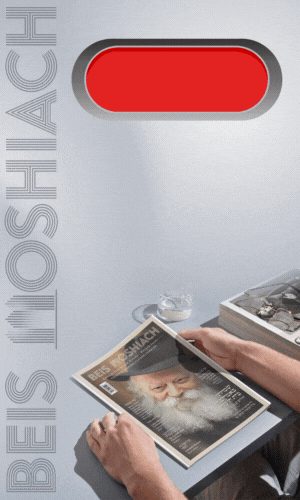New Life, New Mission For Ex-Jobbik Leader
After discovery of his Jewishness, Hungrian Csanad Szegedi now taking on the fight against anti-Semitism he once preached ● Szegedi has embraced his Jewish heritage and joined the Chabad Lubavitch movement ● Full Story
By Stewart Ain / The Jewish Week
Talk about atonement.
“I spent years of my life attacking Jews and encouraging others to hate Jews,” Csanad Szegedi tells students in Hungary’s public schools.
“I spent years of my life trying to convince people that Jews were causing financial and political problems in Hungary and that normal Hungarians suffered because of the Jews,” he says. “It was wrong. I know that now. But I did not know that then.”
Until two years ago, Szegedi, 32, was the powerful vice president of Hungary’s neo-Nazi far-right Jobbik party.
His shocking about-face occurred after he learned his mother, Katalian, is Jewish, and that his grandmother, Magdolna Molnar, survived Aushwitz although much of her family was murdered by the Nazis.
“At first I was hated because I was the man in Jobbik who was an anti-Semite,” he tells the students. “Later I was hated because I was a Jew.”
The revelation about his Jewish heritage came as a shock.
“I was not happy about it, as you can well imagine,” he said.
But rather than run away from it, Szegedi has embraced his Jewish heritage and joined the Chabad Lubavitch movement. Today, the man who made anti-Semitic jokes at rallies is the poster child in the fight against anti-Semitism.
In fact, he is among those leading the effort to shut down a website registered in California but believed written in Hungary, kuruc.info, which plays a major role in Jobbik’s internal politics and whose anonymous contributors are believed to be Jobbik’s leaders.
The site regularly includes the phone numbers of leading Jewish intellectuals and journalists and encourages readers to phone and harass them. One column, called “Jewcrime,” included a hooked-nosed man and scoffed at the “myth” of Aushwitz.
In an interview at the offices of The Jewish Week during a visit here late last month, Szegedi spoke with the help of a translator about what has happened to him and his family since the New Yorker did a feature story about him nearly a year ago.
In March his grandmother, who consciously concealed her Jewish past from her daughter, Szegedi’s mother, died at the age of 95. As he told the New Yorker, “She never wore short sleeves so that no one would see her tattoo.”
Asked if before her death his grandmother admitted that she had been wrong in hiding her Jewish heritage, Szegedi told The Jewish Week: “She didn’t say she had made a mistake, but she admitted that she hid the family’s identity so long because she worried that they would be persecuted if it became known. Even at her deathbed, she said she was scared that the Holocaust would happen again.”
“Nevertheless,” he added, “she said she was happy that at least one of her grandchildren continued to be Jewish. And I can say that my grandmother died as a proud Jewess.”
Szegedi said he last saw her two days before her death “and she was able to repeat from memory the names of the Jewish months. And I heard her for the first time — and the last time — say the bracha [prayer] on the food she ate. … She hugged me and said there possibly may be a God and that if there is a God, she wishes He would bless me and that I should continue on the Jewish path. So that means that she came to terms with her Jewish identity crisis.”
On the other hand, “she forbad” her family from having a Jewish funeral for her, even though Szegedi said he had “wanted [it] very much.”
“I was tolerant and accepted her decision,” he said. “She was not buried in a Jewish cemetery, but she was not buried in a Christian one either. And whenever I visit her grave, I take only a stone and not flowers.”
After her death, he said he found it “very touching” that his brother, Marton, accompanied him to a synagogue “to say Kaddish for her.”
“While we said Kaddish, I thought of all my ancestors who perished in the Holocaust for whom no one ever said Kaddish,” Szegedi said. “It was very rewarding and a good way of reconciliation somehow.”
He said his brother also left Jobbik and although he did not join the Chabad Lubavitch movement, he “grew a beard and covers his head. He goes to shul, and last year he even attempted to fast on Yom Kippur.”
Szegedi said his wife is studying in preparation for converting to Judaism. After that, he said, his two young sons, 3 and 6, will be converted.
“They come with us to shul and on Sunday mornings they go to Hebrew school,” he said. “The 6-year-old puts on a yarmulke in shul, and the little one wants to go because of the good kiddush. … I want them to know about their Jewish culture and Jewish religion, but not force it. We are going to Israel as a family in October and I want them to experience Israel. Yiddishkeit should be a natural way of life and not an obligation.”
Szegedi first learned of his Jewish heritage in 2010 from a political rival in Jobbik who had somehow seen a copy of Szegedi’s grandmother’s birth certificate, which lists her maiden name, Klein. Szegedi didn’t believe it but asked his grandmother about her childhood when he saw her in Christmas of 2011. She said only that her stepparents were Jewish. But the following Easter, she revealed that her stepfather was her uncle, who adopted her after her mother’s death.
For the next year-and-a-half, Szegedi said he had “many conversations” with his grandmother, covering all his questions. “And I saw some sort of relief in my grandmother as she talked about it,” he said, adding that they also talked about the “beauty of Jewish life and the holidays and customs — whatever she remembered.”
A year before she died, Szegedi’s grandmother became very ill. He sought counsel from the chief Chabad Lubavitch rabbi in Hungary, Baruch Oberlander.
“He advised me to say the Shema together with my grandmother,” he recalled. “She said she didn’t remember it anymore, but that if I said it she would repeat it. We did say it and she got better within a week. It was a minor miracle. And we had another year to talk about Yiddishkeit. … Those occasions opened such a spiritual channel within her as she recalled for me all the aspects of Yiddishkeit and her Jewish roots that she remembered.”
In the New Yorker article, Szegedi said his mother “still hasn’t processed” the fact she is Jewish. It said also that Szegedi’s non-Jewish father “didn’t understand” his son’s decisions, apparently referring to his split with Jobbik and embrace of Judaism.
But since the article appeared, Szegedi said his mother has become more comfortable with her Jewish heritage — even coming with him to synagogue on several occasions.
“The way I see it, she feels OK in that environment,” he said. “Somehow she was never able to ask her mother about her roots and the Holocaust — she worried about opening some wounds. … In the last three weeks of my grandmother’s life, she and my mother spoke about their Jewish roots and I do believe my mother has come to terms with it.”
Szegedi said he “convinced” his father, Miklos, to accompany him to Israel earlier this year to see the country and “understand the Jewish side of the coin that he didn’t know until then.”
“We had the greatest time,” he said. “My father is a carpenter who always had a little beard. While in Israel, he wore a hat out of respect, and people thought he was Jewish. I jokingly said, ‘Now you know what it’s like to be a Jew.’”
Asked if he believes there will be another Holocaust, Szegedi replied: “No, I don’t. But I see that anti-Semitism is on the rise and the Jewish people will have to somehow act against it more — it is not enough to simply say, ‘Never again.’ Talking about it may not be enough.”
Sibyl Silver, president of the newly formed European Jewish Heritage Foundation, said her group is dedicated to combatting the growing anti-Semitism in Europe and that Szegedi has agreed to help.
“Szegedi is our lead ambassador to stop anti-Semitism in Hungary,” she said.
As part of that effort, Silver said her organization is working with the Action and Protection Foundation in Hungary to shut down kuruc.info, the racist website based on California. They are working with attorney Michael Sweet, who has gone to federal district court in San Francisco seeking to learn the identities of those behind the website.
Both civil and criminal actions have been started against this website in Hungary, where it is illegal for its citizens to promote anti-Semitism or Holocaust denial, Sweet said. But they are on hold until the identities of those involved can be learned.
To get that information, he served a subpoena upon Bela Varga, a California man whom Sweet believes is connected to the website.
After appearing in court and asking for a new hearing date, media reports said Varga allegedly harassed and threatened to kill Sweet and was arrested in May and released on $250,000 bail. When he failed to appear at two hearings in San Francisco, a warrant was issued for his arrest. Varga, who holds dual Canadian-Hungarian citizenship, reportedly fled to Canada with his wife and two sons.
Sweet has also taken legal action against Cloudflare, a northern California company that he believes has helped transmit the kuruc website on the Internet.
“The focus is on stopping these hate sites,” Sweet said. “Cloudflare has provided some information and we are asking for more. … Our action in the U.S. is to conduct discovery in support of the criminal and civil actions in Hungary.”
Towards the end of the interview, Szegedi was asked about the reaction of those who knew him as an anti-Semitic Jobbik party member.
“Obviously there are bad feelings; it’s hard for me,” he said. “But the Jewish religion is action oriented – it is all about what you do. I trust and I hope that those who judge me will do so on my deeds and actions in the future. … The Talmud teaches not to judge a person until you are in his shoes. I understand people’s feeling and possible skepticism. Perhaps if I were them I would not act any differently.”
597
Join ChabadInfo's News Roundup and alerts for the HOTTEST Chabad news and updates!










































